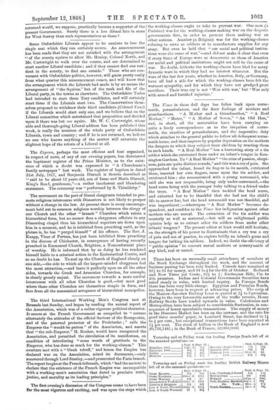The first evening's discussion of the Congress seems to have
been far the most vigorous and exciting, and was upon the steps which the working-classes ought to take to prevent war. One man (a. Parisian) was for the working-classes making war on the despotic governments first, in order to prevent them making war on other nations. Another (a Belgian) was for the working-classes refusing to serve as soldiers or to manufacture supplies for any army. But even he held that " our social and political institu- tions were the cause of war,"—and did not make it clear that even if every State of Europe were as democratic as those of America our social and political institutions might not still be the cause of war. No doubt, hitherto the working-classes have bled for many dynastic wars in which they had no interest whatever. But the wars of the last few years, whether in America, Italy, or Germany, have all had a side for which the working-classes have felt the warmest sympathy, and for which they have not grudged great sacrifices. Their true cry is not t War with war,' but War only with armed and fortified injustice.'






























 Previous page
Previous page